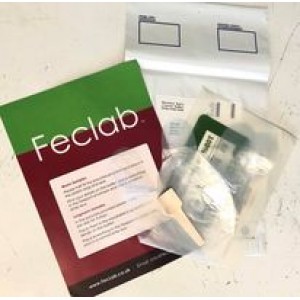Shopping Cart
0 item(s) - £0.00Welcome pet lover! You can login or create an account.
Healthy Training Treats
Feclab Worm Count Test Kit
from: £15.95
Add to Compare
Feclab Worm Count Test Kit
Here at Feclab we pride ourselves on offering a friendly, personal and professional service where you and your pets are our priority!
Faecal Egg Count
Faecal Egg Count (FEC) is a method of determining how many internal parasite Eggs are present in a particular poo sample. It may also be possible to determine the different types of worms or other parasites present.
If eggs are found in a fecal sample it shows that worms are present in the animal.
What FecLab do with your sample
A measured amount of the dung sample is added to a measured amount of a solution (a flotation fluid) that allows the parasite eggs to float to the surface. The mix needs to be carefully measured so the results can be translated into a final ‘eggs per gram’ (or epg). The dung and the solution are mixed well and then strained through a sieve or cheesecloth to get rid of as much debris as possible The filtered solution is then stirred again and a small sample drawn off with a syringe or pipette for examination right away (eggs will start to float to the top as soon as the mix is left undisturbed).
The sample is place into a counting slide which normally has two chambers, each with a grid etched onto the top surface. One chamber is filled, the solution is stirred again and then the second chamber is filled.
The sample is then allowed to stand for a short while allowing the eggs to float to the surface where it is easier to see them under a microscope.
Eggs that can be seen under the etched grid are then counted and identified, as necessary.
The Quantities of poo and flotation fluid that are mixed together determine the multiplication factor that is applied to the egg count result to give a final ‘eggs per gram’.
Why egg count?
By using worm egg counts as part of your Animals health and worm management programme we can greatly reduce the number of times we use chemicals to treat for worms which is not only far better for your Animals it can also be far better for your purse. Using worm egg counts can also reduce the resistance that develops through the continual use of chemicals which can lead to conventional wormers being less effective and the worm burden increase in the Animals.
Eblex, Defra, Scops and the soil association to name a few, are all talking about the benefits of faecal egg counts. As an industry we can ill afford an increase in Anthelmintic resistance within the industry. Faecal egg counts are becoming the preferred route prior to worming any animal.
Why do a faecal egg counts for Dogs!
Dogs can get a variety of intestinal parasites, including some that are commonly referred to as “worms.” Infestations of intestinal worms can cause a variety of symptoms. Sometimes dogs demonstrate few to no outward signs of infection, and the infestation can go undetected despite being a potentially serious health problem. Some canine parasitic worms are hazards for humane health as well.
Dog Roundworm
Roundworms are canine common internal parasites in dogs. Resembling spaghetti, adult worms are three to four inches long. There are several ways dogs can become infected.
Dog Hookworm
Hookworms are much smaller than roundworms—less than an inch long—and reside primarily in the small intestine. Because they feed on an animal’s blood, hookworms can cause life-threatening anemia. Hookworm eggs are passed in the stool and hatch into larvae, and dogs can become infected either through ingestion or skin contact. Please note, hookworms are more common in dogs than cats.
Dog Tapeworm
Long and flat, tapeworms are segmented parasites and range from 4 to 28 inches in length. An infestation can cause vomiting or weight loss. Dogs acquire tapeworms by ingesting an intermediate host, like an infected flea or rodent. When dogs are infected, tapeworm segments—actual pieces of the worm that resemble grains of rice—can often be seen on the fur around a dogs hind end.
Each Worm Count Kit contains a freepost envelope for sending the sample back to the lab. You will receive your results within 48 hours of receipt via email or post - whichever you prefer. All samples are tested twice to give a professional and accurate result.
Write a review
Your Name:Your Review: Note: HTML is not translated!
Rating: Bad Good
Enter the code in the box below:




